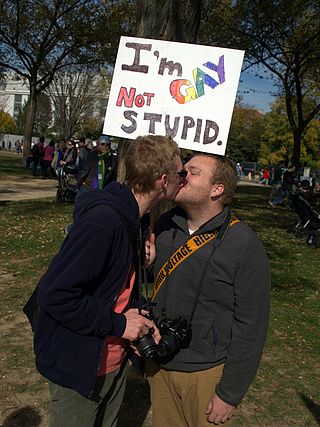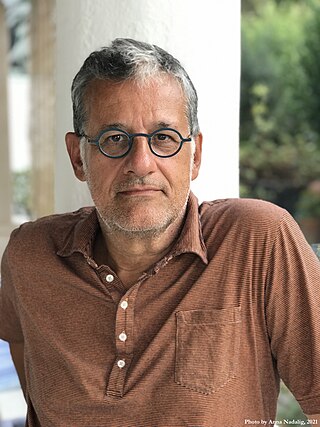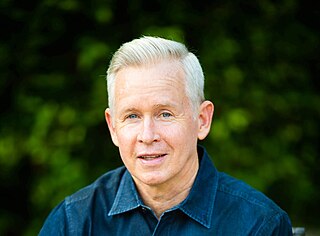Douglas Sadownick is an American writer, activist, professor and psychotherapist. [1]
Douglas Sadownick is an American writer, activist, professor and psychotherapist. [1]
Born in Highbridge, Bronx in 1959, Douglas Sadownick attended Columbia College for his B.A., New York University for his graduate work in English, and the graduate program in clinical psychology at Antioch University for a Master's of Arts in Clinical Psychology. [2] He received his PhD from Pacifica Graduate Institute in Clinical Psychology in 2006. His dissertation was entitled, Homosexual Enlightenment: A Gay Science Perspective on 19th Century German philosopher Friedrich Nietzsche's Thus Spoke Zarathustra.
He is the founding director of the nation's first LGBT Specialization in Clinical Psychology, at Antioch University, and he is also the Founder of Colors LGBTQ Youth Counseling Center, founded in 2011, with Philip Lance, an LGBT affirmative psychologist and community organizer. [1] He is also a co-founding member of the Institute for Uranian Psychoanalysis, [3] [ better source needed ] which is the first Institute in the world dedicated to deepening homosexual self-realization, a form of LGBT psychology.[ citation needed ] He was also a principal co-founder of Highways Performance Art Space in 1989.
His work Sacred Lips of the Bronx (St. Martin's Press, 1994) was nominated for a Lambda Literary Award. [2] His second book, Sex Between Men: An Intimate History of the Sex Lives of Gay Men, Postwar to Present, was published by HarperOne in 1996 and 1997.[ citation needed ] His articles have appeared in the Advocate , the Los Angeles Times , Genre , High Performance , the New York Native , and the L.A. Weekly . He received a GLAAD award for excellence in reporting in 1991. [4]
His paper, "Reading Literature Gay-Affirmatively: A Homosexual Individuation Story," was published in Spring 2006 in the journal Arts and Humanities.
In Love Doesn't Need a Reason the author, Jones, wrote that Michael Callen who was dying of AIDS requested that Douglas Sadownick and Tim should be granted power of attorney over him. [5]
Conversion therapy is the pseudoscientific practice of attempting to change an individual's sexual orientation, gender identity, or gender expression to align with heterosexual and cisgender norms. Methods that have been used to this end include forms of brain surgery, surgical or hormonal castration, aversive treatments such as electric shocks, nausea-inducing drugs, hypnosis, counseling, spiritual interventions, visualization, psychoanalysis, and arousal reconditioning.

The field of psychology has extensively studied homosexuality as a human sexual orientation. The American Psychiatric Association listed homosexuality in the DSM-I in 1952 as a "sociopathic personality disturbance," but that classification came under scrutiny in research funded by the National Institute of Mental Health. That research and subsequent studies consistently failed to produce any empirical or scientific basis for regarding homosexuality as anything other than a natural and normal sexual orientation that is a healthy and positive expression of human sexuality. As a result of this scientific research, the American Psychiatric Association removed homosexuality from the DSM-II in 1973. Upon a thorough review of the scientific data, the American Psychological Association followed in 1975 and also called on all mental health professionals to take the lead in "removing the stigma of mental illness that has long been associated" with homosexuality. In 1993, the National Association of Social Workers adopted the same position as the American Psychiatric Association and the American Psychological Association, in recognition of scientific evidence. The World Health Organization, which listed homosexuality in the ICD-9 in 1977, removed homosexuality from the ICD-10 which was endorsed by the 43rd World Health Assembly on 17 May 1990.

Societal attitudes toward homosexuality vary greatly across different cultures and historical periods, as do attitudes toward sexual desire, activity and relationships in general. All cultures have their own values regarding appropriate and inappropriate sexuality; some sanction same-sex love and sexuality, while others may disapprove of such activities in part. As with heterosexual behaviour, different sets of prescriptions and proscriptions may be given to individuals according to their gender, age, social status or social class.

Michael Callen was an American singer, songwriter, composer, author, and AIDS activist. Callen was diagnosed with AIDS in 1982 and became a pioneer of AIDS activism in New York City, working closely with his doctor, Dr. Joseph Sonnabend, and Richard Berkowitz. Together, they published articles and pamphlets to raise awareness about the correlation between risky sexual behaviors and AIDS.

Terms used to describe homosexuality have gone through many changes since the emergence of the first terms in the mid-19th century. In English, some terms in widespread use have been sodomite, Achillean, Sapphic, Uranian, homophile, lesbian, gay, effeminate, queer, homoaffective, and same-gender attracted. Some of these words are specific to women, some to men, and some can be used of either. Gay people may also be identified under the umbrella term LGBT.
Richard A. Isay was an American psychiatrist, psychoanalyst, author and gay activist. He was a professor of psychiatry at Weill Cornell Medical College and a faculty member of the Columbia University Center for Psychoanalytic Training and Research. Isay is considered a pioneer who changed the way that psychoanalysts view homosexuality.

Homophobia encompasses a range of negative attitudes and feelings toward homosexuality or people who identify or are perceived as being lesbian, gay or bisexual. It has been defined as contempt, prejudice, aversion, hatred, or antipathy, may be based on irrational fear and may sometimes be attributed to religious beliefs.

Homosexuality is sexual attraction, romantic attraction, or sexual behavior between members of the same sex or gender. As a sexual orientation, homosexuality is "an enduring pattern of emotional, romantic, and/or sexual attractions" exclusively to people of the same sex or gender. It "also refers to a person's sense of identity based on those attractions, related behaviors, and membership in a community of others who share those attractions."

Charles Silverstein was an American writer, therapist, and LGBT rights advocate. He was best known for his presentation as a graduate student before the American Psychiatric Association in 1973 that led to the removal of homosexuality as a mental illness from the organization's Diagnostic and Statistical Manual. He was also the founding editor-in-chief of the Journal of Homosexuality.
Gay affirmative psychotherapy is a form of psychotherapy for non-heterosexual people, specifically gay and lesbian clients, which focuses on client comfort in working towards authenticity and self-acceptance regarding sexual orientation, and does not attempt to "change" them to heterosexual, or to "eliminate or diminish" same-sex "desires and behaviors". The American Psychological Association (APA) offers guidelines and materials for gay affirmative psychotherapy. Affirmative psychotherapy affirms that homosexuality or bisexuality is not a mental disorder, in accordance with global scientific consensus. In fact, embracing and affirming gay identity can be a key component to recovery from other mental illnesses or substance abuse. Clients whose religious beliefs are interpreted as teaching against homosexual behavior may require some other method of integration of their possibly conflicting religious and sexual selves.
Jack Drescher is an American psychiatrist and psychoanalyst known for his work on sexual orientation and gender identity.
Mitchell Lynn Walker is an American gay activist and Jungian psychologist who has written many influential articles and books on gay-centered psychology.
Richard C. Friedman was an academic psychiatrist, the Clinical Professor of Psychiatry at Weill Cornell Medical College, and a faculty member at Columbia University. He has conducted research in the endocrinology and the psychodynamics of homosexuality, especially within the context of psychoanalysis. Friedman was born in The Bronx, New York.
Joe Kort is an American psychotherapist, clinical social worker, board-certified clinical sexologist, author, lecturer and facilitator of therapeutic workshops. He works as Clinical Director and founder of The Center for Relationship and Sexual Health in Royal Oak, Michigan.

How to Have Sex in an Epidemic: One Approach is a 1983 manual by Richard Berkowitz and Michael Callen, under the direction of Joseph Sonnabend, to advise men who have sex with men (MSM) about how to avoid contracting the infecting agent which causes AIDS. It was among the first publications to recommend the use of condoms to prevent the transmission of STDs in men having sex with men, and has even been named, along with Play Fair!, as one of the foundational publications in the advent of modern safe sex.

Vittorio Lingiardi is an Italian psychiatrist and psychoanalyst, Full Professor of Dynamic Psychology and past Director of the Clinical Psychology Specialization Program (2006-2013), Faculty of Medicine and Psychology, Sapienza University of Rome, Italy. He has coordinated with Nancy McWilliams the second edition of the Psychodynamic Diagnostic Manual, the PDM-2.

Domestic violence in same-sex relationships or intragender violence is a pattern of violence or abuse that occurs within same-sex relationships. Domestic violence is an issue that affects people of any sexuality, but there are issues that affect victims of same-sex domestic violence specifically. These issues include homophobia, internalized homophobia, HIV and AIDS stigma, STD risk and other health issues, lack of legal support, and the violence they face being considered less serious than heterosexual domestic violence. Moreover, the issue of domestic violence in same-sex relationships has not been studied as comprehensively as domestic violence in heterosexual relationships. However, there are legal changes being made to help victims of domestic violence in same-sex relationships, as well as organizations that cater specifically to victims of domestic violence in same-sex relationships.
LGBTQ psychology is a field of psychology of surrounding the lives of LGBTQ+ individuals, in the particular the diverse range of psychological perspectives and experiences of these individuals. It covers different aspects such as identity development including the coming out process, parenting and family practices and support for LGBTQ+ individuals, as well as issues of prejudice and discrimination involving the LGBTQ community.

Philip Lance is an American psychoanalyst and former community organizer who began his career as an Episcopalian priest. He was one of the first persons ordained by the Episcopal Church whose homosexuality was openly acknowledged by the ordaining diocese prior to his ordination. He is the founder of Pueblo Nuevo Development, now known as Pueblo Nuevo Education & Development Group (PNEDG), and founder of the Camino Nuevo Charter Academy (CNCA) schools. Together with Douglas Sadownick, he is the co-founder of Colors LGBTQ Youth Counseling Services. He is a Fellow of the International Psychoanalytic Association and a member of The Psychoanalytic Center of California.
John E. Pachankis is an American clinical psychologist. He is the Susan Dwight Bliss Professor at the Yale School of Public Health. His research has examined the nature of stigma and its impact on mental health and social functioning. He specifically studies the psychological experiences of LGBT individuals, including processes of identity formation and identity concealment; the cognitive, emotional, and behavioral consequences of stigma-based rejection and exclusion; and affirmative mental health treatments for LGBT populations.